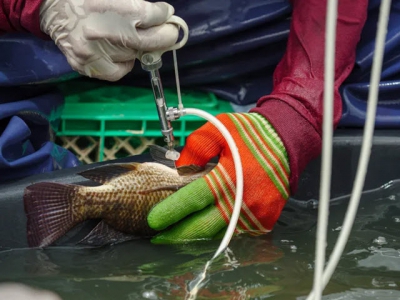High hopes for an oral Francisella vaccine for tilapia

Researchers are optimistic about the possibility of developing an oral vaccine against francisellosis in tilapia, following promising trials in Thailand.
Tilapia tend to be treated against bacterial infections through the use of injectable vaccines or antibiotics. An oral vaccine, delivered through feed, would be a popular alternative to both
While effective injectable bacterin vaccines against Francisella noatunensis subsp. orientalis exist, tilapia farmers would prefer the option of vaccinating the fish by immersion or orally, due to the lower cost and ease of application.
Developing such a vaccine could help to reduce the use of antibiotics in tilapia aquaculture – as these are widely used against the range of bacterial challenges facing the sector.
However, as the researchers behind the trial note, oral and immersion vaccines are often less efficacious probably due to the lack of adjuvants in immersion and oral vaccines.
As a result, the study aimed to optimise the formulation and dose of the Francisella noatunensis vaccine with mucosal adjuvants for oral and immersion delivery.
Methodology
During the trial tilapia fry averaging 6 g were given three concentrations (high, medium, low) of antigen, combined with the oral adjuvant by oral gavage (delivery to the digestive tract via a tube), to optimise the dose needed to induce an immune response to Francisella noatunensis. The immune response obtained was then compared with fish vaccinated by immersion, both with and without an immersion adjuvant.
The fry were then boosted by the same route at 420 degree days (DD), and samples of serum, mucous ) were then taken at 840 DD for specific antibody responses measured by ELISA and western blotting.
The researchers found that “specific IgM titres were significantly elevated in serum and mucus of fish given the high dose adjuvanted vaccine by gavage”.
In addition, by using western blotting with serum, “a significant immunogenic reaction was evident between 20 and 37 kDa in the fish given the high dose oral vaccine by gavage”, they add.
“As protection against Francisella noatunensis provided by the injection vaccine was correlated with specific antibody responses these findings suggest the oral vaccine also has potential to provide protection. Further studies are needed to optimise delivery of the vaccine via feed,” they conclude.
Related news
 Pangasius farming - Water quality and biosecurity
Pangasius farming - Water quality and biosecurity Maintaining good water quality and strict biosecurity measures can help pangasius farms remain productive and profitable.
 How Aflatoxins threaten pangasius catfish production
How Aflatoxins threaten pangasius catfish production The importance of aquaculture in Asia goes beyond its relatively high contribution to the worldwide aquaculture output.
 Why stress causes smaller tilapia to spawn
Why stress causes smaller tilapia to spawn Tilapia living in crowded aquaculture ponds or small freshwater reservoirs adapt so well to these stressful environments that they stop growing and reproduce